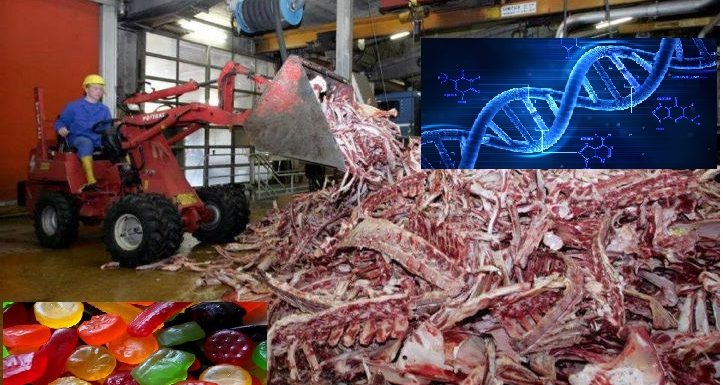Sometime in the year 2004, Muslims in United Kingdom were rudely
shocked by claims that products such as Lucozade contained traces of
alcohol and Ribena uses a filter made from gelatin derived from pigs
in its production process. These claims were later found to be true
which galvanised the Muslim community into taking decisive steps in
boycotting the products.
Initially, the producer of Ribena and Lucozade, GlaxoSmithKline
(GSK) were slow to response to protests by the Muslim community. As the
Muslims were a minority in the UK numbering only about two million in
strength, the drink producer was confident that these protests would
not affect the existing sales of the products. What happened after
was completely the reverse.
There is no official statement by the producers on the actual drop
in the sales of these products; however GSK seemed to be concerned
enough about the figures to have sought a fatwa from the UK Muslim Law
Council, the highest authority in the UK on halal food. It took the
Council approximately five months to deliberate on the issues whereby
opinions of various Scholars were sought and earlier rulings on Halal
food were referred to and examined. The fatwa issued were no less
controversial and divided opinions amongst the Muslim community on the
validity of the fatwa.
“I see no harm in consuming Ribena and Lucozade which contain
traces of ethyl alcohol and animal ingredients that do not bear their
original qualities and do not change the taste, color or smell of the
product”, the late Zaki Badawi, formerly the UK Muslim Law Council
chair and former adviser on Islam to the Prince Of Wales, concluded.
Lucozade contains 0.01% of ethyl alcohol to ensure the flavouring
permeates the whole drink.
The Council accepted the opinion and rationale of the California
based foundation for Islamic Knowledge which stated that that alcohol
level of 0.01 to 0.05 percentage is insignificant and therefore the
product can be considered Halal. The Islamic Fiqh Academy made a
finding that gelatin made from haram animals is allowed if it has
undergone fundamental process of transformation through chemical
changes and thus, ruled that Ribena is halal. The fatwa on alcohol is
further strengthened by the opinion of Imam Sheikh Yusuf Qaradhawi in
2008 on the permissibility of consuming food and beverage that contain
minute amounts of alcohol subject to firstly, it does not intoxicate
and secondly alcohol was as a result of natural fermentation. The
necessity of the presence of alcohol is in its role as soluble and
flavouring for the food industry. The Imam was also of the opinion that
products derived from pigs are permissible if it has undergone a
process of denaturation.
The fatwas for the parameter of alcohol allowed in food and beverage is based on the jurisprudential principles of “transformation” and “assimilation“.
This fatwa argues that a Haram matter that mixes with a much larger
volume of Halal matter to the extent that it loses the Haram attributes
by way of taste, color and smell, would be transformed into a Halal
matter and may be consumed. Thus, jumhur ulama (majority Scholars) has
opined that the level of intoxicant allowed to exist in food and drink
produce shall not be more than 0.05% on the basis that at this level
the food or drink does not intoxicate. The authority on Halal food in
Malaysia, ie Jabatan Agama Islam Malaysia (JAKIM) accepts this view.
Some consumers and Islamic Scholars are not convinced that these
principles of transformation and assimilation are properly applied and
argued that any matter remains Haram even if it is in minute quantities
quoting a Hadith by the Prophet that says: “Of that which intoxicates in a large amount, a small amount is Haram” And again, “If a bucketful intoxicates, a sip of it is Haram” (Reported by Abu Dawud and At-Tirmidhi).
Scholars for the principles of transformation and assimilation
explained that the Hadith refers to a Haram matter such as alcohol
which is still in its one hundred percent pure state of intoxicant. If
the alcohol is mixed with a predominantly Halal matter to the extent
that it loses its Haram attributes, it may be transformed into a Halal
matter, whereby the intoxicating element has lost its intoxicating
abilities. The condition for consuming produce that contain such
impurities is that the impurities are at levels allowed by Shariah
Scholars such as stipulated in the fatwa issued by the UK Law Council.
The applications of these principles are understandably one of
necessity and an evil that could not currently be avoided. The danger
however, is that its liberal application over an extended time may lull
the Muslim community into accepting the situation as a permanent
measure. There are several reasons why we have not progressed towards
finding a better solution for our food consumption. The foremost is the
commercial viability of the Haram matters as food soluble, flavourings,
preservatives, stabilisers and enzymes used in the food industry. A
Halal solution requires heavy investments in rendering it a
commercially viable alternative to the Haram elements. The Muslim
community are not without its share of Scientists but they have not
prioritised investments in these areas and collaborative efforts in
addressing these issues are severely lacking. Such investments in the
food industry is worthwhile considering that the food flavouring
industry in the US alone now has annual revenues of about $1.4 billion;
meaning that the potential for any development in Halal food flavouring
and the likes are vast and immense.
The Muslim community are also largely unaware of their strength as a
consumer market segment. After the controversial case of Ribena and
Locozode, another major snack food manufacturer in the UK, came under
fire for not informing consumers that its products contain traces of
alcohol. Enraged Muslim consumers ceased to buy these products and the
snack food manufacturer suffered a similar drop in sales as did GSK.
These issues came to light partly due to efforts by concerned
consumers and strong food lobbyists and watchdogs such as the UK Halal
Food Authority. The society has been actively lobbying for halal
symbols on popular food products, labelling and packaging that would
list information about ingredients of the products including items
deemed as Haram by the Shariah. Through their efforts, the Muslim
community became quickly aware of any issues in the food industry and
for giant food manufacturers such as GSK a significant drop in sales
persuaded GSK that the Muslim community are a consumer based segment
that cannot be ignored. In Malaysia, a similarly strong watchdog in
Halal food is the Consumer Association of Penang. United in Halal
issues, the Muslim market segment have the means to dictate market and
industry trends. Therefore, if they use their strength as a market
segment, it is possible for this market segment to demand compliance by
food manufacturers with Halal requirements and to invest in Halal
alternatives for food solubles, flavorings, preservatives, stabilizers
and enzymes. The Muslim community have to consciously seek a better
solution instead of relying on the principle of “Necessity makes the unlawful lawful” (Dharurat-Necessity)
that justifies the total application of principles of transformation
and assimilation in most situations for an indefinite period.
Global Arab Network



